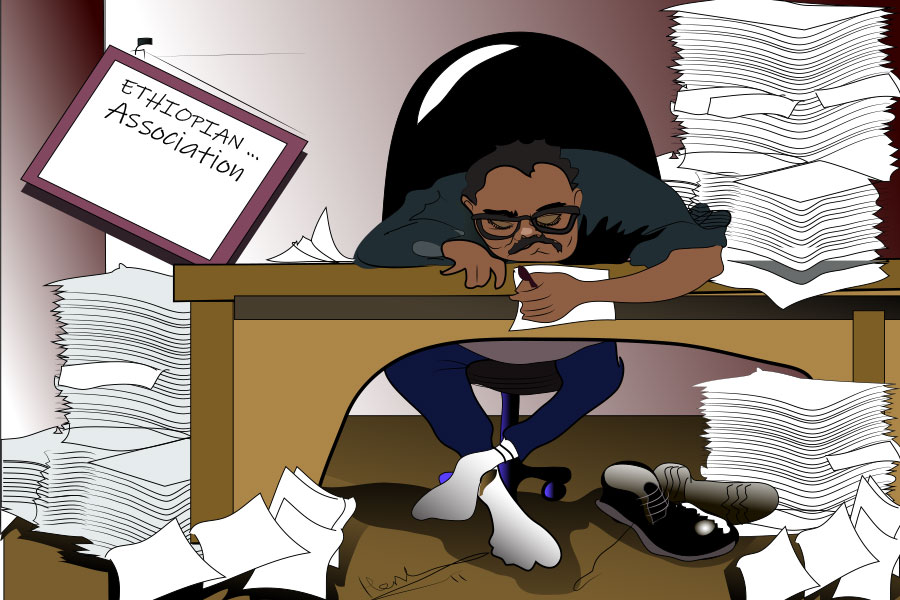
Featured | Sep 28,2019
Oct 10 , 2020
By Desalegn Tegabu
The infancy, disconnect and failed engagement of professional bodies has left the national discourse in a rut. Partly to blame for this are the professional associations themselves, writes Desalegn Tegabu (MD) (zdesalegn@gmail.com), a senior public health professional.
The Novel Coronavirus (COVID-19) pandemic has inspired a surge of unproven medical products and methods that claim to prevent or cure the disease. But that is just the tip of the iceberg to the concurrently and long-running claims of a new "cure" for diabetes or even the unproven and unsubstantiated assertions of products that eliminate water hyacinths, which have at times received mainstream validity.
The aura of the "hidden" potential of the "gifted healers" has left science professionals in dismay and desperation. Indeed, culpable in this are the professionals themselves. Take the recent government decision to resume learning across the country and the deafening silence of educational and health professionals on the matter, which kept the public starved for validation from independent professionals.
The infancy, disconnect and failed engagement of professional bodies has left the national discourse in the rut. Partly to blame for this is the legacy of decades of interference by the government within these bodies.
Professional associations are organisations “formed on the basis of a profession,” states Ethiopia’s recent civil society law. “Its objectives may include protecting the rights and interests of its members; promoting professional conduct, building the capacities of members or mobilise professional contributions of its membership to the community and the country.”
This is a comprehensive definition, and it helps to look at how it fits within the context of international practise through Julia Evetts' (Prof.), renowned work on professionalism.
She considers certain features of professional associations: exclusive ownership of an area of expertise and knowledge; the authority to define the nature of problems and provide solutions; the supportive professional community; autonomy and working for the public good. Ethiopia’s law on professional associations captures the spirit of these requirements but is not explicit enough on the role of such associations in setting and regulating professional standards and engagement on national policymaking activities.
As a whole, professional associations based on their activities, mandate and services are divided into four groups: member-benefit, professional regulatory, certifying and designation-granting. Hence, it is possible to agree that associations are non-profits created to further the interests of a particular profession by improving productivity, education and research, engagement in policymaking and ethical governance of members.
Professional associations play a major role in the improvement of productivity by enhancing the competence of its members, encouraging evidence-based practises and knowledge translation. This indirectly will raise public trust in the profession and support the achievements of the nation’s growth and transformation aspirations.
One of the key activities of associations is improving education. This also is in indirect promotion of increases in productivity and addressing the changing needs of the economy. Professional associations set standards, maintain and monitor educational and professional qualifications. This includes assessing the relevance and quality of the education programme and its suitability to the needs of the ever-changing economy.
When a professional association is unable to, in a sense, regulate its practitioners, it will have neither a reputation to protect nor the standards to sustain. Its mere presence will not guarantee that there will be public trust and consideration for the profession the association attempts to represent. Worse still, the capture of these institutions by politics will mean the active undermining of the professions.
One way of addressing this disconnect of the association with the public, and instrumental to safeguarding the confidence in the profession, would be to create strong linkages with higher learning institutions. This can result in the joint appraisal of gaps in sectors, the design of educational programs, assurance of educational quality and possible certification. In addition, the linkage will create opportunities for students to engage with the associations early for a smooth transition to the profession with the right knowledge, skill and discipline.
Professional associations should also maintain trustworthy and strategic cooperation with research institutions for joint appraisal of problem-solving, context-specific learning and setting of ethical studies. Additionally, associations play a key role in establishing and maintaining research networks with both local and international organisations for the exchange of information, benchmarking, research collaboration and research management. The last one can include running professional journals.
The practice is abundant around the world but barely observed in Ethiopia beyond a ceremonial curtsey. Being a pool for top-notch experts in the field, associations contribute immensely if engaged in agenda setting, formulation of policy, adoption, implementation and evaluation. This can be realised through productive engagement with the government in committees, councils and commissions. This engagement should be inspired and adhered to both in the spirit of public interest and integrity of the profession.
All of these are necessary requirements for any professional association to shine and contribute toward the country’s development aspirations. The associations need to have flexible strategies to respond quickly to unforeseen changes and to increased demand from the country by maintaining the relevant profession's ethical conduct and integrity.
Professional associations both individually and collectively should seek a chartered status by the government to have more legitimacy and power to deal with issues affecting the professions they represent and the country at large. The associations should also own and maintain continuous professional development programmes to advance the knowledge and boost the skills of its members.
Advocacy and engagement of professional associations in professional standard-making and policymaking should get serious attention among lawmakers and the public. It is one of the essential requirements in the effort to develop and prosper.
PUBLISHED ON
Oct 10,2020 [ VOL
21 , NO
1067]


Featured | Sep 28,2019

Radar | Feb 27,2021

Featured | Sep 08,2019

Fortune News | Jan 01,2022

Sunday with Eden | Apr 01,2023

Editorial | May 18,2019

My Opinion | Jun 22,2019

Fortune News | Mar 02,2019

View From Arada | Nov 07,2020


My Opinion | 131497 Views | Aug 14,2021

My Opinion | 127853 Views | Aug 21,2021

My Opinion | 125831 Views | Sep 10,2021

My Opinion | 123461 Views | Aug 07,2021

Dec 22 , 2024 . By TIZITA SHEWAFERAW
Charged with transforming colossal state-owned enterprises into modern and competitiv...

Aug 18 , 2024 . By AKSAH ITALO
Although predictable Yonas Zerihun's job in the ride-hailing service is not immune to...

Jul 28 , 2024 . By TIZITA SHEWAFERAW
Unhabitual, perhaps too many, Samuel Gebreyohannes, 38, used to occasionally enjoy a couple of beers at breakfast. However, he recently swit...

Jul 13 , 2024 . By AKSAH ITALO
Investors who rely on tractors, trucks, and field vehicles for commuting, transporting commodities, and f...

Jun 28 , 2025
Meseret Damtie, the assertive auditor general, has never been shy about naming names...

Jun 21 , 2025
A well-worn adage says, “Budget is not destiny, but it is direction.” Examining t...

Jun 14 , 2025
Yet again, the Horn of Africa is bracing for trouble. A region already frayed by wars...

Jun 7 , 2025
Few promises shine brighter in Addis Abeba than the pledge of a roof for every family...

Jun 29 , 2025
Addis Abeba's first rains have coincided with a sweeping rise in private school tuition, prompting the city's education...

Jun 29 , 2025 . By BEZAWIT HULUAGER
Central Bank Governor Mamo Mihretu claimed a bold reconfiguration of monetary policy...

Jun 29 , 2025 . By BEZAWIT HULUAGER
The federal government is betting on a sweeping overhaul of the driver licensing regi...

Jun 29 , 2025 . By NAHOM AYELE
Gadaa Bank has listed 1.2 million shares on the Ethiopian Securities Exchange (ESX),...